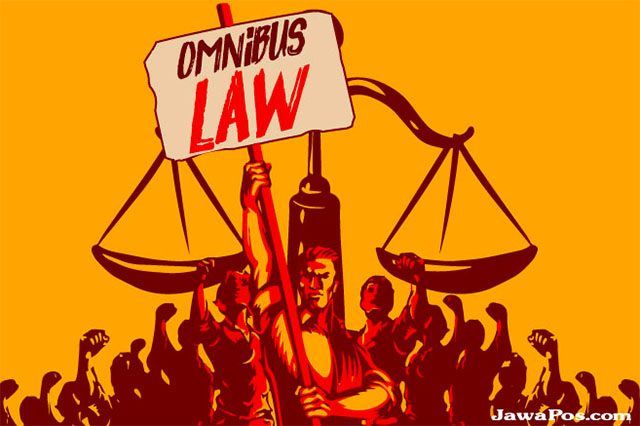Omnibus Law Ciptaker Solutions to Overcome the stagnation Economy
By: Ismail) *
Omnibus Law Cipta Karya is expected to be the government’s strategy in solving problems related to overlapping regulations, overlapping regulations is one of the reasons investors feel hesitant to invest in Indonesia, so that the economy in Indonesia tends to stagnate.
Coordinating Minister for the Economy Airlangga Hartarto said the government had power with 75 percent support in parliament for the passing of the Omnibus Law Bill. As much as 75 percent of this support is the strength of the party supporting the government.
Previously, Secretary of the Coordinating Ministry for Economic Affairs, Susiwijono, explained a number of things that were obstacles to the progress of Indonesia’s economy , especially the issue of institutional bureaucracy.
He considered that the bureaucracy was considered inefficient in serving the community, especially those related to the ease of business licenses. In addition, the relatively low competitiveness also triggers the slow pace of domestic economic development.
It must be acknowledged that developed countries indeed facilitate investment. If we want Indonesia to advance, of course it must be open to investment and not to complicate licensing.
We need to know that regulations relating to business licensing or investment in Indonesia still seem complex with a variety of bureaucracies who are obese both at the central and regional levels with a total of 43,604 regulations. In addition, Indonesia’s competitiveness rating is still low.
The rating agency Moody’s Investors Service lowered its forecast for Indonesia’s economic growth this year, from 4.9 percent to 4.8 percent. Moody’s projections are based on the existence of the corona virus pandemic which has caused a global economic slowdown.
Deputy Chairman of Commission XI, Fathan Subchi, expressed his full support for the discussion of the Omnibus Law Cipta Karya Bill. The politician from the PKB faction considered that the regulation was a solution to accelerate poverty reduction in the country.
Fathan explained, in the last five years economic growth was relatively stagnant at 5 percent. Although the growth rate has made the domestic economic conditions relatively stable, it has not been able to provide great opportunities for economic leaps.
The Omnibus Law Work Draft Bill that has been agreed upon by the Parliament also provides a formula that aims to reduce or deregulate corrupt bureaucracy, but also maintain the synergy between the people and the regions.
In a meeting that took place on April 2, 2020 which was broadcast live through Youtube of the DPR RI. The outcome of the meeting was that the DPR agreed to bring the Work Copyright Omnibus Bill to be submitted to the Legislation Body (Baleg).
Before the House of Representatives Speaker Azis Syamsudin knocked on the hammer, he asked the members present whether the bill could be agreed to be brought to the Legislation Body. The Results Participants in the plenary session answered in unison, “Agree !!”
The work copyright bill consists of 15 chapters and 1 74 articles. Some of the substance that regulates licensing, business ease, investment and MSME or cooperatives is 86.5 percent. While the rest discussed employment, economic zones, imposition of sanctions, as well as research and innovation.
The work copyright bill also considers conditions concerning the uncertainty and slowdown in the global economy. Where, there is a trade war, tensions in the Middle East to the Corona virus quite influential on the world economy and in Indonesia.
The Work Craft Law (Draft Bill) for the Omnibus law program is a solution for investors to invest amid fears of an economic slowdown due to Covid-19. He hopes that the bill can be passed immediately, so that the Employment Copyright Act can be used after the spread of the corona virus ends.
The Omnibus Law Cipta Karya is expected to be a big leap to win the competition and advance the national economy. This was agreed by Sociologist from the Department of Sociology at the UGM Faculty of Social and Political Sciences, Arie Sujito, believing that the Cipta Karya Bill was a major improvement effort to transform Indonesia’s economy in the future.
This bill is still open for discussion and harmony in the Indonesian Parliament. Of course the input and aspirations of the public and stakeholders conveyed to the Government will also be brought in discussions with the Indonesian Parliament.
This strategy is the government’s effort to revive the national economy, and ensure a healthy bureaucracy in the licensing sector.
) * The author is a political social observer
